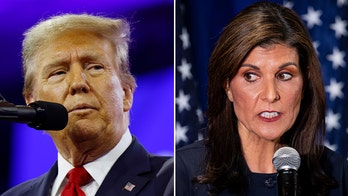
Sen. Marco Rubio, R-Fla., is surrounded by reporters during a tour of the convention floor at the Republican National Convention in Tampa, Fla., on Wednesday, Aug. 29, 2012. (AP Photo/J. Scott Applewhite) (AP2012)
A clear line of messaging was laid out in the three days of the Republican National Convention: the economic results four years later clearly show the professional politician President Barack Obama did not fulfill his promises of making good on "hope and change" and from what we saw this convention successful businessman Mitt Romney will.
It was a narrative that was necessary for Mitt Romney to make if he’ll have any chance at achieving his presidential aspirations. Undoubtedly, American’s disappointment about the unacceptable economic results is far and away Obama’s most vulnerable attack line - it’s his Achilles heel.
Speaker after speaker took to the podium and reminded Americans about the long list of promises undelivered by an administration that took office four years ago with impossible expectations.
Despite the national media’s deliberate attempts to overlook it, there was another theme clearly evident to those of us who attended the Republican National Convention – how Hispanic it was. Most notable were the Republican governors, congressional members, and senators who expressed the aspirations of millions of U.S. Hispanics and Latinos across the United States. The state-wide elected leaders who also underscored the disappointment felt by so many Americans in the economic state of affairs. Mainly, the lack of jobs, unfettered deficit spending, the bloated national debt, an ever-weakening dollar, and the attack on religious freedoms.
These were assets that the party showcased proudly and rightly, despite LA Mayor Antonio Villaraigosa’s inexplicable comment earlier this week that they shouldn’t.
- Republican Convention: GOP Hopes to Build Momentum with Speeches from Chris Christie, Ann Romney
- Republican Convention: Ann Romney Remarks to Latinos Impressed Some, Offended Others
- Republican Convention Delayed As Tropical Storm Isaac Approaches Florida
- Republican Convention: Carlos Gutierrez Talks Economy, the Romneys & Latinos
- Republican Convention: FL State Senator Anitere Flores on the Latino Vote
- Best Pix of the Week
- Mexicana Flight Attendants Turned Calendar Girls Feud after Success
- Body-Art Advertising: Intriguing Art On Beautiful Women
The line-up included the nation's first Latina governor, Susana Martinez of New Mexico; Luis Fortuño, Governor of Puerto Rico; Brian Sandoval, Governor of Nevada; U.S. Senator Marco Rubio of Florida, and the party’s newly minted Latino star, Senate hopeful Ted Cruz of Texas.
What makes this list of heavy hitters exciting is not so much their heritage, but the reforms of economic responsibility they are all advancing in their home states – each one has pushed an agenda of reducing taxes, lessening the regulatory burden on small businesses, defending personal liberties, and reducing the control government has on the lives of every American.
Then there was Olympic speed skater, Derrick Parra's moving personal story of his incredible achievements at the 2002 Olympic games. These are prominent Americans who rose up from poverty on the shoulders of their parents hard work and prayers.
Each one spoke about their humble beginnings that the vast majority of Americans identify with, each one spoke of times in their life when they experienced need, scarcity and longing to prosper. Each one spoke of their unique experiences growing up Latino in a nation that provided them equal opportunity to achieve limitless goals regardless of their skin color, creed or religion.
Puerto Rican, Cuban, Mexican-American - each one spoke of how the Hispanic community is not America’s problem, but part of the solution. It was motivational, it was inspiring and it was executed brilliantly.
Then there were the many Hispanic-themed events throughout the three days of the Convention. Hispanic organizations like The Latino Coalition, The Hispanic Leadership Network and my own, The Libre Initiative, which organized a successful policy forum, luncheons and concerts sanctioned by the RNC. It was the perfect setting for Hispanics to contribute to the policy dialogue every American is having about the role government should have in our lives, and the constitutional limits politicians need to be reminded of.
Hispanics have long expressed their desire to be heard, to have a place at the table, and stand shoulder to shoulder with other Americans in shaping public policy. No one can say we, Latinos were not heard in Tampa.




